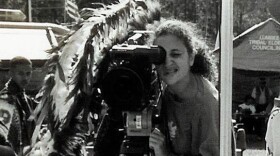Some of the most popular films in our nation’s cinematic history are about the life, culture and customs of the American South. “Gone With the Wind” — the story of Southern belle Scarlett O’Hara and her love life set against the backdrop of the Civil War and Reconstruction — remains one of the highest-grossing films to date. And the first film to ever be screened in the White House was the 1915 silent film “Birth of a Nation,” a film set in Civil War and Reconstruction-era South Carolina that glorifies the Ku Klux Klan.
But despite their box office successes and large cultural footprint, these films omit crucial pieces of history, truth and nuance about the South. In this month’s Movies on the Radio, host Frank Stasio and film experts Marsha Gordon and Laura Boyes discuss how Hollywood films have shaped cultural knowledge and narratives about the region. They talk about watching films that gloss over the darker parts of Southern history, but they also explore how more contemporary films, like “Junebug” and “ATL,” resonate with viewers as true to their own experiences.
is a film professor at North Carolina State University and a public scholar at the National Endowment for the Humanities. Boyes is the and the curator of the
Southern Film: Hits and Misses
"Gone With The Wind" - MISS
Gordon: This is the idyllic plantation world where the South has been destroyed by the Civil War. That's the imagination here. … We're 80 years after the end of the Civil War, and the biggest picture of the year basically has only good things to say about life on the plantation.
Boyes: One thing that's really puzzling about it is Scarlett O'Hara has to be the least appealing heroine in many ways. She's selfish, she's mean, she's a very odd character.
"Junebug" - HIT
Gordon: It's so gentle. It's so loving about North Carolina, about the South. On the one hand, the plot is about art and being an outsider, but it's really about family and place and coming home.
Boyes: It has a breakout performance by Amy Adams that is just so adorable in this movie.
"Band of Angels" - MISS
Boyes: This is an extremely bizarre film based on a novel by Robert Penn Warren ... he was considered to be a progressive person on racial issues at the time. But this film is so mixed up with a lot of its characterizations.
Gordon: I often feel embarrassed, especially when I'm showing films to students ... this was actually considered funny. Often jokes are made in particular at the expense of African American performers. To reflect on the way that has reverberated — especially in representations of the South, with carriage drivers and maids and mammy figures, and what that means as we see it resurfacing [in] 1915, 1939 — what about when we see it now?
"ATL" - HIT
Gordon: The director Chris Robinson talked about the fact that he really wanted to make a film that was like “Diner” or “Do the Right Thing” … and choosing to set it in this capital of Black Southern creativity. And I think if you think about the films that came out in particular in the 90s and early 2000s, they were so often centered on Los Angeles or New York and a different set of circumstances.











